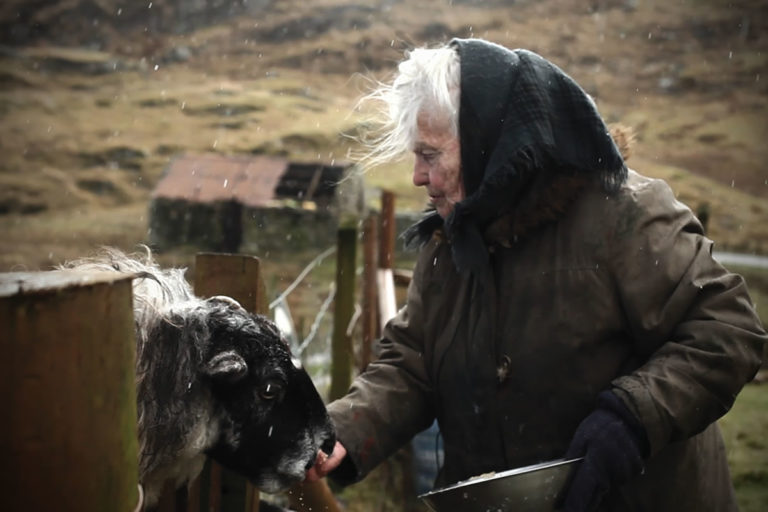Can telling your story save your life? HOW I GOT OVER follows 15 formerly homeless and/or incarcerated women as they craft an original play, based on their harrowing true-life stories, to be performed one-night-only at The Kennedy Center. As observers of their creative process, we are front row to the performing arts’ capacity to heal trauma, create connection, and start a conversation. With the nation’s capital as a fitting backdrop, HOW I GOT OVER was filmed in and around N Street Village – a Washington, D.C. temporary housing facility for low income and homeless women – during the program’s 12-week collaboration with “Life Stories.” The brain-child of the Theatre Lab Dramatic School of the Arts, and funded by the National Endowment for the Arts, “Life Stories” offers the women of N Street professional level theater training. Since 2007, Theatre Lab teacher Thomas Workman has collaborated with 30 N Street women annually, creating pieces that grapple with their fractured histories as a mechanism through which to achieve catharsis. In 2012, challenged by Kennedy Center Executive Director Michael Kaiser to “dream big,” Theatre Lab co-founder Deb Gottesman set out to create a groundbreaking theatrical experience. This time, the women of N street would not only create a piece, but perform it. None of these women had ever acted before, yet they would take the Kennedy Center stage, one of the most prestigious arts spaces in the world, acting out their pasts so they might more freely live out their futures. A special grant afforded “Life Stories” the opportunity to hire a local playwright, Jennifer Nelson, to observe and record the women as they shared their dark oral histories; tales of neglect, domestic violence, and incest that led to lives of drug abuse, addiction, and homelessness. These narratives, alternately humorous, painful, spiritual, and dramatic, were prompted by Workman via improvisational acting exercises, roundtable discussions, and one-on-one interviews. The play that emerged from Nelson’s weaving of the accounts, titled “My Soul Look Back in Wonder,” was nothing short of incendiary. Told alone, these stories shock and sadden; told together, patterns emerge and thematic connections between collective experiences are drawn. Faced with the traumas that were put upon these women, and the devastation that followed as they attempted to survive their circumstances, homelessness looks less like a result of their choices and more like an unavoidable outcome of the lives they were born into. HOW I GOT OVER employs the vérité approach. The stories are often brutal, even difficult to watch, but the directness of the delivery demands we not avert our eyes. While highlighting the connections between them, the portraits simultaneously demonstrate the uniqueness of each individual. Three of these women – Cheryl, Taccara, and Petrina – offer contrasting histories. CHERYL: 62 years old, Cheryl has been affiliated with N Street since 1990. Cheryl credits N Street and the affiliated Luther Place Church with her 20 years of sobriety from a 35-year battle with addiction, and with saving her life. Having spoken at the U.S. Capitol, and sitting on numerous boards related to homelessness and poverty, she is among the most important homeless advocates in Washington, D.C. Cheryl considered it a great honor to finally be asked to participate in Theatre Lab, yet struggled more than others as the performance loomed. Through the support of Deb and her peers, Cheryl made it to the stage, finding a deeper, previously untapped courage within herself in the process. TACARRA: Despite her middle-class upbringing, Tacarra, 29, was molested for the first time at the age of 5. Tacarra attempted to get help, but her otherwise supportive mother and step-father didn’t believe her story, leading Tacarra to heavy substance abuse in her teenage years – years that hosted a second violation, this time by her father who raped her upon his return from the military. An HIV-positive mother of two, Tacarra is formerly incarcerated for “distribution,” and credits the structure of jail with helping her to straighten out. Through her performance in “My Soul Look Back and Wonder,” which was attended by her mother, Tacarra was finally able to find the validation, and the voice, that have eluded her since childhood. PERTRINA: After witnessing her step-father’s molestation of her sister as a child, Pertrina, 56, was gang-raped by neighborhood boys at the age of 16. In her late teens, alcohol became her drug of choice. Following years of living as a functioning alcoholic, maintaining successful employment in multiple government agencies – including the U.S. Senate – Pertrina was exposed to crack cocaine in her 40’s. Busted for “distribution” and made a first-time offender at the age of 50, Pertrina entered N Street in recovery. Until “Life Stories,” Pertrina never once shared the horrific events of her youth that led to her addiction, incarceration, and ultimate homelessness. With these zoomed in pictures of the ladies’ pasts, we see that homelessness is a paradigm of many faces. In perhaps the most poignant line of “My Soul Look Back in Wonder,” the women tell us, “Although we’re homeless, we’re not hopeless. And even though I’m not famous, you will remember who I am.” Temporarily liberated from the stereotypes associated with homelessness, the women of N Street are given the opportunity to speak for themselves, and be heard as individuals. They find hope, and we know who they are. In the end of HOW I GOT OVER, the women take the stage; as they quite literally step out of the darkness and into the spotlight, we bear witness to the tremendous power of the validated human spirit to transform. This fearless, triumphant exploration of the curative powers of arts education calls us to reconsider the root causes of homelessness, the shameful truths of poverty in America, and what great social feats might be accomplished with increased funding to arts education.



